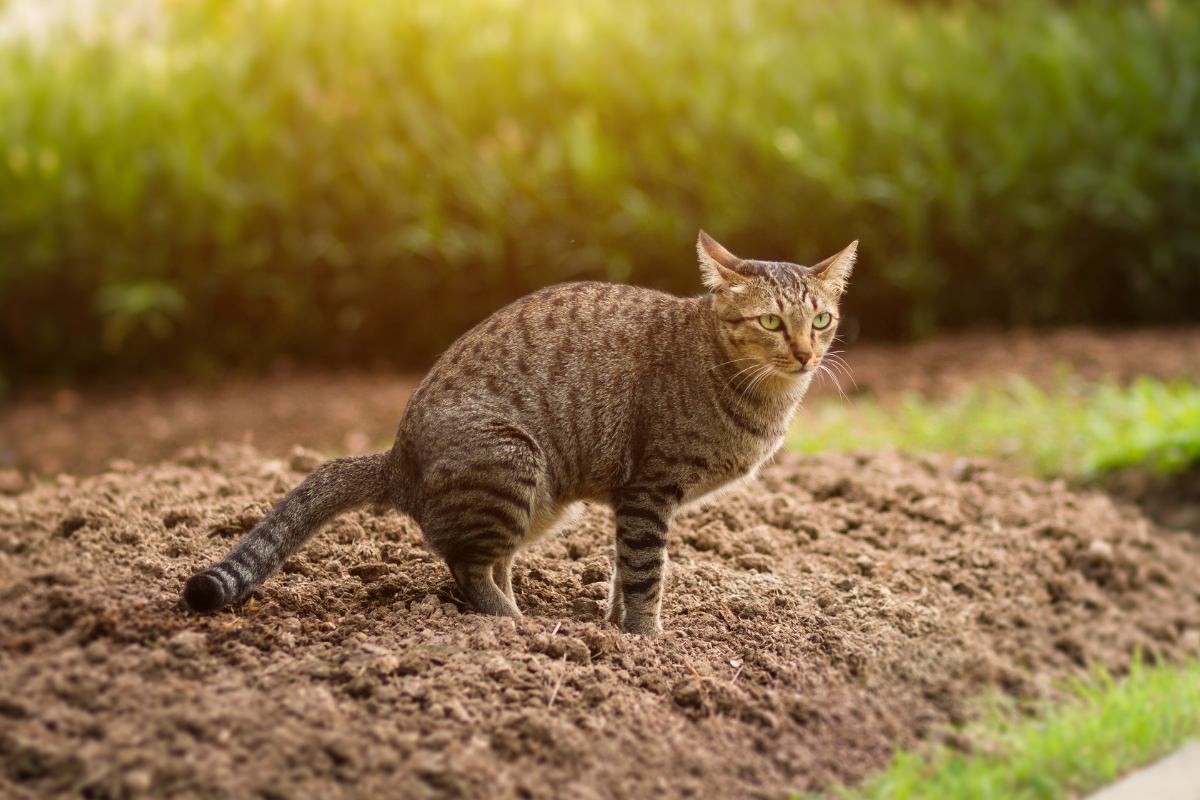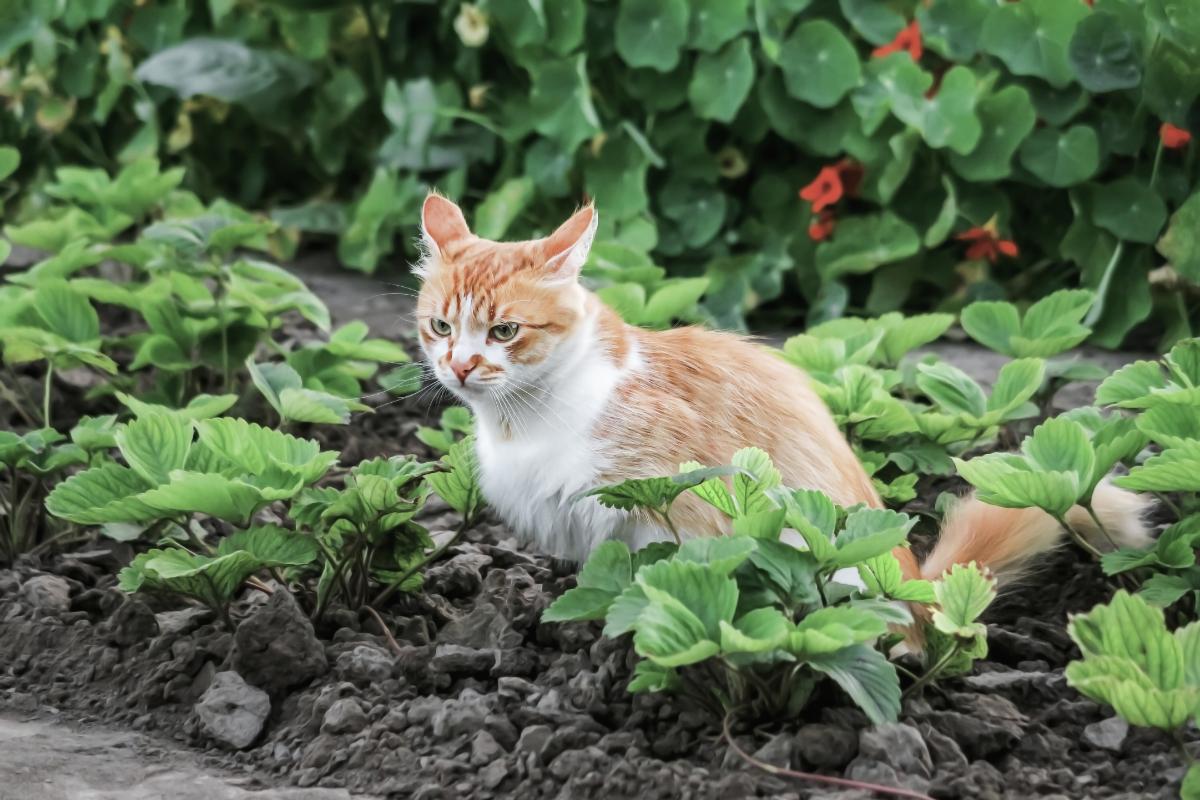Are you struggling with neighbourhood cats using your garden beds as a toilet? There’s nothing worse than getting ready to plant some seeds and finding little nuggets just below the surface of the soil. So, how can you stop this from happening? Before we look at some solutions, you should understand the dangers associated with coming into contact with cat faeces.
Contact With Cat Faeces Can Be Dangerous To Your Health
Apart from being a nuisance for you, cat faeces are not good for you, your garden or your plants. It’s common for cat faeces to contain a parasite known as Toxoplasma. This parasite can be passed onto humans by touching the faeces themselves or ingesting vegetables that have come into contact with contaminated soil.
While this might not be a problem if you wear gloves while you’re gardening, think about what happens when the faeces come into contact with the vegetables that you’re growing. If you don’t wash your vegetables well or you don’t cook them, you could inadvertently be eating contaminated soil.
If you happen to contract Toxoplasma, you could experience symptoms like fever, headaches and muscle aches. In severe cases, this parasite can produce symptoms like vomiting, diarrhoea, seizures and confusion.
So, your best course of action is to stop neighbourhood cats from using your gardening beds as a toilet in the first place. Here are some tactics that you can try. Remember that all cats are different, so some of these methods will work for some but not for others.
1. Talk To Your Neighbours
If you know where the offending cat lives, why not have a talk to its owner? Your neighbours might not even be aware that their cat is wandering into your yard for its toileting.
Sometimes, just a friendly chat can have the result you’re looking for. Remember to be polite and kind because the cat is likely to be a beloved pet and part of the family.
2. Call Your Local Council
If you don’t get a positive reaction from your neighbours or you really don’t feel comfortable approaching them about the problem, why not give your local council a call?
Many councils around Australia now have cat-containment laws that prohibit felines from roaming around the neighbourhood. These laws have been put in place to protect both the cats themselves and also the local wildlife.
So, check your council laws before contacting them to alert them to a roaming cat. This takes the pressure off you as it’s up to a council officer to talk to the neighbours who are not adhering to the local laws.
3. Use Strong Scents To Deter Cats From Your Garden Beds
Cats do have quite sensitive noses and there are certain scents that they just don’t like. This is one way to keep them away from your garden beds. Here are a few to consider.
Citrus Fruits
Cats generally don’t like the smell of citrus fruits. This natural remedy is good to try because it’s not harmful and can even benefit your garden.
Simply bury some lemon or orange peels in the soil instead of putting them in your compost. They’ll break down over time and add valuable nutrients to the soil.
Or, you could make a mixture of citrus juice and water and spray it on the soil around your garden beds. Remember that the scent won’t last for too long so you might have to repeat this often.
Cinnamon
Cinnamon is another scent that cats try to avoid and sprinkling this around your prized plants will help to deter the felines from digging in your garden.
Banana Peels
Seasoned gardeners know that banana peels are highly beneficial for adding potassium to the soil. The good news is that cats really don’t like the scent of bananas. So, consider burying some banana peels just below the surface of the soil.
Chicken Manure
Chicken manure has a strong smell that can be offensive to cats. This is great news for you because this power-packed fertiliser is also great for growing lots of healthy vegetables and flowers.
4. Use Mulch To Cover The Soil
Consider covering the bare soil on your garden beds with a mulch that is uncomfortable for cats to walk on and dig in. You could consider mulch materials such as:
- Coarse bark or wood chips
- Pine needles
- Gravel or small stones
It’s also a good idea to make sure that you keep your garden beds well-watered so that the soil is never allowed to dry out completely. Cats are averse to digging in wet soil so this should help to keep them away.
5. Add Some Plants That Cats Don’t Like
There are some plants that cats will naturally avoid. Many of these either have a strong smell or they might be spiky or prickly in nature. Here are a few to try.
Rosemary
Rosemary not only has a lovely strong scent but it can also be a little prickly. It’s a lovely plant to add as a border around your veggie beds as it can also keep other garden pests away. Plus, you can use it in all your culinary adventures in the kitchen.
Lavender
Although it has lovely soft foliage, lavender does have a nice sweet scent. This becomes even more prominent when the leaves are brushed against. Lavender is also great for planting around your veggie or flower beds. Just make sure that you grow it on a slightly raised mound because lavender doesn’t like having wet feet.
Curry Plant
Curry plants are not only attractive but they also produce a delicious curry scent when brushed up against. And, you can use their lovely soft grey foliage in your cooking.
6. Block Access To Your Garden Beds
While you can’t stop cats from jumping over fences, you can stop them from gaining access to your garden beds. All you have to do is create a fence around your veggie garden and add a mesh roof to fully enclose it. Using chicken wire is an inexpensive way of doing this.
Or, you could consider crop covers that can be purchased and placed over your vegetables. Not only will these keep the cats out but they will also stop the birds from eating your tomatoes.
Inserting sticks into the soil throughout your garden beds can also deter cats. Place sticks vertically at regular intervals so that the space becomes difficult and uncomfortable for cats to walk or dig through. This method is particularly effective because it disrupts the flat, open soil that cats prefer for toileting.
7. Scare The Cats Away
It’s no secret that cats like to do their toileting in private and don’t really like to be watched while they’re doing it. You can use this to your advantage by keeping an eye out during the day to see if you can catch a neighbourhood cat in action.
When you notice the cat, start walking towards it loudly so that it notices you. Don’t be too aggressive because you just want to shoo the cat away.
You could also try spraying some water from the hose near where the cat is toileting to scare it away. Cats don’t like getting wet so this should be a good deterrent, please be kind though.
8. Additional Deterrent Methods
Besides the traditional approaches, there are innovative and tech-savvy solutions that can help keep cats away from your garden beds.
Ultrasonic Repellers
Ultrasonic Repellers are devices that emit a high-frequency sound, which is irritating to cats but remains inaudible to humans. This ensures your garden's peace is undisturbed while effectively keeping curious cats at bay.
Motion-activated Sprinklers
Motion-activated Sprinklers detect movement and spray a gentle burst of water. This method startles cats away without causing them harm, serving as a humane deterrent to protect your green space.
Visual Deterrents
Visual Deterrents involve hanging reflective tapes or old CDs from trees to create unpredictable movements and reflections. Cats dislike these visual disturbances, making this a simple yet effective strategy to discourage their presence in your garden.
By using some of the methods that we’ve mentioned, you should be able to deter neighbourhood cats from using your garden beds as a toilet and enjoy all your fresh produce safely.







